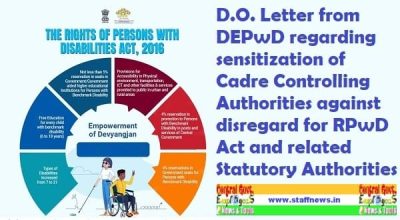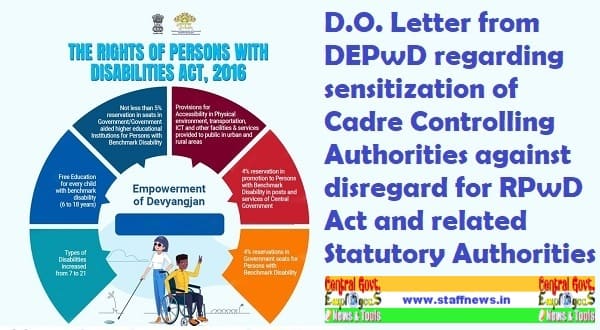Disregard for RPwD Act and related Statutory Authorities – D.O. letter from DEPwd for sensitization of Cadre Controlling Authorities: DoT Order
No. 01-01/2025-SCT
Government of India
Ministry of Communications
Department of Telecommunications
(SCT Section)
Room No. 713, MDS Bhawan, Minto Road
New Delhi, 18-02-2025
To:
1. Secretary, TRAI
2. Chairman-cum-Managing Director, MTNL, New Delhi
3. Chairman-cum-Managing Director, BSNL, New Delhi
4. Chairman-cum-Managing Director, TCIL, New Delhi
5. Chairman-cum-Managing Director, ITI Ltd., New Delhi
6. CEO, C-DOT
7. Director, Wireless Monitoring Organisation
8. Jt. CGCA (Admin.), O/o CGCA
9. Administrative Officer, TDSAT
Subject: D.O. Letter dated 13.01.2025 from DEPwD regarding sensitization of Cadre Controlling Authorities against disregard for RPwD Act and related Statutory Authorities.
Madan/ Sir,
I am directed to forward herewith a copy of self-explanatory D.O. Letter No. CC-12016/1/2023-CCPD dated 13.01.2025 received from Joint Secretary, Department of Empowerment of Persons with Disabilities for strict compliance of the instructions as contained therein.
Encl.: As above.
Yours faithfully,
(Amit Rajan)
Under Secretary to the Govt of India
Tel.: 2321 0248

Joint Secretary
Government of India
Ministry of Social Justice & Empowerment
Department of Empowerment of Persons with Disabilities
D.O. No. CC-12016/1/2023-CCPD
Dated: 13th January, 2025
Madam/Sir,
Greetings from the Department of Empowerment of Persons with Disabilities. As you are aware, the parliament enacted the Rights of Persons with Disabilities Act, 2016 to develop the India into an inclusive and accessible nation where the individual autonomy and dignity of persons with disabilities, their freedom of choice, divergent needs and capacities are respected by one and all. The Act provides several rights to the persons with disabilities with respect to education, employment, accessibility, justice, etc. and thus creates legally binding obligations on state as well as non-state agencies. It is noted with due concerns that there is widespread lack of awareness and sensitivity in the government establishments about the provisions of this Act. Often, it is brought to the notice of this department that government establishments are not responding to the notices and recommendations issued under the provisions of the Act by statutory authorities.
To put the above in context, it is pointed out that the Act at Chapter XII envisages for establishment of an Office of the Chief Commissioner for Persons with Disabilities (CCPD) with a mandate to monitor implementation of the Act. Section 75 mandates the CCPD to inter alia identify, suo motu or otherwise, the provisions of any law or policy, programme and procedures, which are inconsistent with the Act and to look into complaints inter-alia, concerning matters relating to deprivation of rights of persons with disabilities either on his own motion or on the application of any aggrieved person and recommend necessary corrective steps.
In order to enable the GCPD to discharge its mandate effectively, Section 77 of the Act empowers it with the powers of a civil court and declares that the proceedings before it are judicial in respect of functions mentioned in the Section. Section 76 mentions that whenever the Chief Commissioner makes a recommendation to an authority in pursuance of clause (b) of section 75, that authority shall take necessary action on it, and inform the Chief Commissioner of the action taken within three months from the date of receipt of the recommendation.
It further States that Provided that where “authority does not accept a recommendation, it shall convey reasons for NON acceptance to the Chief Commissioner within a period of three months, and shall also inform the aggrieved person In other words, the government establishment may or may not accept the recommendations, but not informing the CCPD of the action taken or reasons for Non-acceptance is not an option before them. Unfortunately, in more than 50% of the Cases, the establishments have failed to do so.
Lastly, Section 93 of the Act makes non-furnishing of information sought a punishable offence. The CCPD though, empowered to imposes fines under Section 89 of the Act, has used this rarely. It has been observed that in about 80% of the cases the notices for comments are responded to only after issue of a reminder or a notice for persons hearing. In still worse cases, some establishments fail to appear or get represented during the hearings as well, Recently, Hon’ble Supreme Court has admitted a PIL Namely Dr. Satender Singh Vg UOI {WP(C) 636/2024} on this very issue,
You are, therefore, requested to Sensitise the Officers of your ministries/departments as well as the establishment under the administrative control of your ministry/department against such disregard for the RPwD Act and authorities created under it.
Yours sincerely,
(Rajeev Sharma)
To,
Secretary
All Ministries/ Departments


COMMENTS